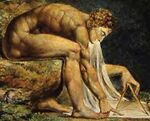Jodrell Bank
Jodrell Bank is the largest of the seven astronomical observatories in London, and is the oldest that has been in continual use by astronomers. Here Halley's Comet, the rings of the Moon, and the Squinting Astronomer Nebula were first observed.
It is located atop a handsome, thin building in High Holborn, near the Houses of Parliament. The observatory is only used during the winter months, when temperature inversions keep the London air pure and cloudless. For the rest of the year the telescope is strapped to the roof under a tarpaulin, seats are put in, and it functions as an IMAX cinema, mosque, ice rink, and nudist picture gallery. A new computerized booking system was installed in 2003 after an unfortunate quadruple booking led to nude, bearded skaters having rainforest scenes projected onto them.
Guided tours cost 7p a person (children 4p, astronomers get in free on production of a valid AstroCard), and are conducted by two cheery Cockney twins, Neville and Terry, whose patter consists largely of making fun of other planets. Bookings should be made in advance, since bookings made after the tour has taken place still crash the computer system, and we get those blue, shivering imams back.
Administration[edit]
The observatory itself is run by the Ministry of Agriculture and Astronomy, while the grounds are owned by the Ministry of Observatory Grounds and Space-Based Defence and leased to the Grass of Britain Heritage Committee. The teashop is a franchise of the Royal Zoological Society and sells fresh fish, slabs of raw meat, bamboo leaves, and buckets of live ants.
A Keeper of the Observatory is appointed by the Privy Council every alternate June, and is assisted by the Warden of the Smaller End and the Virger of the Big Glass Piece, two retired Church of England deacons who are warranted to be of a blameless life and who were overlooked for promotion to vicar on more than ten occasions. The National Trust owns the wall tiles on the south wall, leasing out day-to-day management to the England and Wales Wall Tiles Conservancy Board. Since 1940 the post of Keeper has been vacant.
History[edit]
Jodrell Bank was originally Jodrell House, private residence of the Bovril heiress Bess of Vril Hall and her third husband, the smirking, lisping foreigner Gioderello di Moneta, and they lived there from their marriage in 1584 to Gioderello's disappearance in a usury huffing incident in 1600. By then he had shed his foreign name like a polecat-infested ruff and established a private 'club' to which he would invite noble but penurious pigeons to play cards. He accepted notes of hand if they were so unfortunate as to lose amounts greater than the change in their pockets. The widowed Bess, her hair "gold with grief" as the chroniclers put it, thus found herself the owner of the largest string of ruined castles and tarnished titles in England. The house was incorporated as a bank in 1617, and flourished for over half a century.
In 1670 the young Isaac Newton was trying to get the tiny quill pen tied to the standish to flow freely, when he saw some ermine-clad lords passing discreetly into a back room. Always a curious little bugger, he enquired of one of the goblins, and learnt that for special clients the poker games were still going on. That week's Proceedings of the Royal Society, which had dropped through his letter-box only that morning, contained an interesting correspondence between Messieurs Blaise Pascal and Annette Funicello, under the general title "On the Oddities or Likeliheads of Divers Hands in the Game or Sporte of the Poker".
Under Newton's ownership the bank was converted to an observatory. His earliest discoveries were of the Big Cloud, the Giant Bird, the Threatening Chimney, and once he had got the hang of telescopes, of Mistress Elizabeth Spofford of Pudding Lane, an attractive lady with a roof garden. One day he had to go and clean up, and left the telescope pointing at Pudding Lane with the sun bearing down through it. Jodrell Bank survived the conflagration but the disgraced Newton had to disguise himself as an apple barrow boy and flee to Kent for more apples, where he lay low until he heard that some German had learnt about performing astronomy at night and was proposing to discover things. This ushered in the Space Race, now considered the Golden Age of observational astronomy.
Haunting and Marriage[edit]
Many ancillary staff who have spent nights alone in Jodrell Bank have reported eerie sensations, clammy fingers exploring their bodies, strange breathing sounds, and so on. Well, astronomers are lonely types and must get their nookie where they can, but after a clerical error in the obituaries department of The Times, Jodrell Bank was listed as the most haunted observatory in Britain. The original report is believed to refer to the Beast of Bodmin Moor, the most hunted ocelot in Britain.
The same reporter went on to join the Parliamentary Drafting Agency, and is alleged to be the one responsible for the numerous loopholes in the Civil Partnership Act 2004, allowing buildings solely or largely dedicated to astronomical, oceanographic, seismological, or geophysical purposes to be united as man and wife. Jodrell Bank tied the knot with Woods Hole on 23 December 2005 and commented through the Warden's office that they were both very happy.
